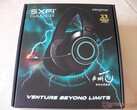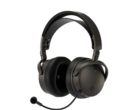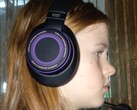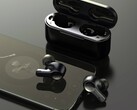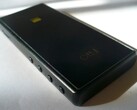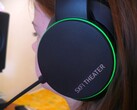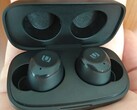Introduction
In the audiophile world, there is no lack of options for high fidelity (or hi-fi) audio. However, a relatively small company based out of California has made a lot of noise in this market over the past five years.
Audeze is widely considered to be one of the best in the audio business. The company routinely creates some of the best-sounding headphones targeted directly at the audiophile crowd. The Mobius gaming headset is one such device, though it is geared for gaming. The headset offers spectacular sound quality and has several well-designed features, including 3D audio that can be tuned to the shape of the user's head.
I've used the Audeze Mobius for the past three months with my Windows desktop PC. From the moment I put it on and pumped lossless audio through its planar drivers, I fell in love. Here's why.
Design and Fit
The Audeze Mobius looks similar to most other high-end headphones on the market. I do appreciate the more subdued aesthetic; most gaming headsets have a cyberpunk-esque look, which is garish in my opinion. The Mobius earpieces are black with a honeycomb graphic on the side of each earpiece, so they won't stand out in public. Audeze also offers the Mobius headphones with a copper-colored trim around the earpieces, adding some smart-looking color.
The Mobius headphones are made from a soft, flexible plastic that can twist and bend comfortably. It feels a bit thin in the hand, but the headband has retained its shape despite some prolonged torsion. The adjustable shafts that extend the earcups feel more rigid. They stay in place when adjusted to secure a good fit.
There is a strip of memory foam along the center of the headband. It's a bit uncomfortable as it reshapes around the head, but the discomfort fades after about 10-15 seconds. The foam around the earcups is full and soft, creating a good seal around my medium-sized ears. The vinyl coating surrounding the foam holds up to pinching and squishing, so it shouldn't peel off anytime soon.
The biggest downside of the Mobius headphones is their weight. These are wireless headphones, so they have a relatively large battery inside them. Without cables, the headphones weigh about 365 grams, and my head feels every one. After using them for a while (roughly 30 minutes), I stop noticing the weight. However, they never sit as comfortably as non-wireless headphones like the Audio Technica M50s, which weigh about 200-250 grams.
Overall, the fit and finish are excellent. There are other headphones made from sturdier and lighter stuff, but the Audeze Mobius headphones are well-made. Considering they target the gaming market, these cans don't look like traditional gaming gear, which is a plus in my book.
Audio Quality
Sure, the Audeze Mobius headphones look nice, but how do they sound? In a word: stunning. The Mobius headset is one of the only gaming-oriented headsets to use planar magnetic drivers in lieu of the more common dynamic drivers. The result is clean, distortion-free audio. Bass, mids, and highs ring through the earpieces clearly, and the overall quality is excellent.
I ran the Mobius through lots of lossless audio, and everything sparkled. In particular, the Mobius handles subtle touches in music better than most gaming headsets and beats some mid-range studio options. Ghost notes on the snare in jazz pieces, fingers sliding across guitar strings, and even orchestra members inhaling before blowing their horns are all barely audible but present, creating a rich audio experience that is one of the best I've enjoyed.
The Audeze Mobius' drivers are 100 mm in size. They can handle frequencies from 10 Hz to 50 kHz and can be cranked up to 120 dB. I didn't notice any distortion at max volume when hooked up to my Windows desktop PC via USB or the 3.5 mm headphone jack.
Microphone Quality
The included microphone offers solid voice quality suitable for streaming, video calls, and even voice recording. It's about on par with mid-range USB microphones like the Blue Snowball. It is detachable, and there is a dedicated mute switch and volume wheel for the microphone, giving users quite a bit of control over how their voice is captured. A dedicated microphone is still a better option for those reliant on voice recording or streamers that want the best quality voice, but the microphone included with the Audeze Mobius is a step above the ones typically included with gaming headsets.
Software and Features
Another high point of the Audeze Mobius headset is its extensive feature set. Physically, the Mobius headphones have multiple connection options and lots of dials for ease of use. The headphones can connect to an audio source via Bluetooth, a 3.5 mm audio cable, USB-A, or USB-C. I cannot notice any difference between the USB and 3.5 mm connection; the quality of each connection is similar enough that I can't tell whether one has an advantage over the other. The Bluetooth connection is solid but experiences some pitch and connection issues inherent to all Bluetooth audio devices. The Mobius headphones support SBC, AAC, and LDAC. The range is decent (roughly 8-10 meters from the audio source). The battery lasts about 8-9 hours at 50% volume.
In addition to the USB-C port and 3.5 mm jack used to connect to a device, the left earpiece also holds two volume wheels. One is used for the headphones' volume, and the other is reserved for the microphone. Clicking and scrolling the headphone and volume wheel will scroll through tracks or EQ presets, respectively. Long pressing the mic wheel will cycle between audio modes (Hi-Res, 2-channel stereo, and 7.1 channel). These shortcuts take some time to learn and use effectively, and there are short pauses as the headphones switch to the next setting, but they can be time savers.
Lastly, there is a button labeled "3D." This enables the flagship feature of the Mobius: 3D audio, which uses Waves NX technology. Once 3D audio is enabled, clicking this button anchors the headphones to a point in front of the user. The feature simulates a speaker set up and works very well; as I turn my head to the left, the left earpiece grows quieter and the right earpiece gets louder, similar to what happens with desktop speakers.
This feature also works well in games, particularly first-person shooters that support 3D audio. Characters walking behind the in-game player will sound like they're coming up behind the player, and spatial audio is handled well. The feature feels a bit gimmicky at times, but it can add to the immersion of some games. It's also one of the best implementations of spatial audio I've experienced with a headset, gaming or otherwise.
The dedicated Audeze app deserves a special mention. The customization options here are overwhelming, but many are quite useful. If users are so inclined, they can measure their head to get precise spatial audio via the 7.1 channel mode and 3D audio setting. I didn't take the time to change these options for this review, and the spatial audio worked well enough. There are also eight dedicated sound profiles that highlight certain aspects of games, but they only seem to change the audio curve to push highs or emphasize mids and lows.
One improvement I'd like to see is the ability to set a custom sound curve. If that option exists, I haven't found it in the software yet. Considering these are billed as high-end studio-quality headphones, the lack of full customization of the audio curve is confusing.
Conclusion
The Audeze Mobius headset is one of the absolute best audio purchases gamers can make. The headphones sound excellent out of the box and have lots of customizable options, many of which are targeted straight at gamers. The included microphone is also significantly better than most headset mics and should be adequate for streaming, video calls, and voice recording.
The pièce de résistance of the Mobius is the 3D audio feature, which works very well. It's not always useful, but it can greatly add to a game's experience. The excellent audio quality is another plus; it's hard to find headphones at this price point that sound this good.
There are some downsides, the chief of which is the lack of control of the overall audio curve. It would be nice if users could tune the full audio range to their liking via the app, but this option is strangely absent. The weight also takes some adjustment, and the battery life isn't as good as other Bluetooth headphones'. Otherwise, the experience is fantastic.
The Audeze Mobius headset sets a high bar for other gaming headsets. They are expensive at about US$400, but for audio enthusiasts that also want an extensive feature suite for gaming, the headphones are worth every penny.
The Audeze Mobius headphones can be purchased from Audeze or Amazon for $399.
Disclaimer: The author of this review received the Audeze Mobius Headphones free of charge for the purpose of testing.















